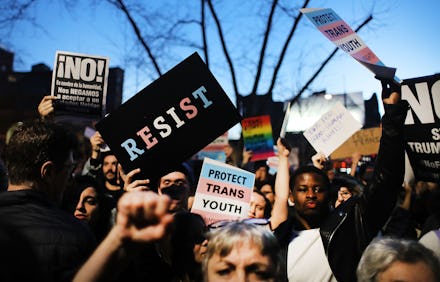After almost 100 years, the ACLU is diving into grassroots organizing. This is the agenda.

MIAMI — Since 1920, the American Civil Liberties Union has done one thing: lawyer up. The ACLU spent the past century tracking claims of unconstitutional injustice and bringing backup in the form of lawyers, wherever they've been able.
Now, after almost a hundred years, the ACLU is finally stepping out of the courtroom and into the streets.
On Saturday, the ACLU launched "People Power," a new grassroots organization that will turn newly activists into community leaders to fight back against President Donald Trump's agenda. At a crowded stadium in Miami, with over 2,300 viewing parties watching live across the country, the ACLU's leaders and top lawyers inaugurated a veritable army of volunteers to become a national grassroots network. More than 160,000 people have already signed up, and they're about to receive their first marching orders in the fight against unconstitutional attacks on immigrants.
"We're opening the doors of the church, and now come in," ACLU Executive Director Anthony D. Romero said to the crowd on Saturday. "We need you to be protagonists in this struggle."
The newly formed People Power project will combine traditional strategies with digital tools largely learned on the Bernie Sanders campaign, including text-banking, email lists, and national mapping and event planning tools that will coordinate a national network of volunteers led by a new staff of ACLU project directors.
People Power is the creation of the newly minted ACLU National Political Director Faiz Shakir, who joined the ACLU in January to lead the new front. Shakir told Mic on Saturday that the airport protests across the country in the wake of Trump's so-called Muslim Ban demonstrated exactly how powerful grassroots activism can support a legislative agenda, cementing the ACLU's need for grassroots support.
"The courts move because people move them," Shakir said.
And in the wake of the airport protests, the ACLU saw a dramatic influx of donations and new resources, to the tune of $21.4 million.
"The crowds have funded us, and the crowds will get something in return in the form of grassroots mobilization," Shakir said.
"The courts move because people move them."
Shakir, along with organizer Becky Bond, is one of the several key players who recently went over to the ACLU from the Bernie Sanders campaign. Shakir says that the volunteers who had to self-organize during the campaign got a unique look at how to use digital tools to quickly mobilize supporters. And in his estimation, organizers for Sanders did unglamorous work in support of a seemingly unreachable goal.
"The same spirit that motivated them is the spirit I'm looking for now," Shakir said. "I like that in a DNA of an activist: That you're shooting for the moon and trying to do something great, and something hard."
And Shakir guarantees that the road ahead for People Power is hard.
The first item on the agenda is a campaign the ACLU is calling "Freedom Cities." People Power is putting out a guide with nine specific model laws that protect immigrants, like a "Don't Ask" rule that prevents officers from randomly inquiring into someone's immigration status during otherwise routine police work. People Power is directing its volunteers to ask the top law enforcement official in their community — a sheriff or police chief, for example — and pressuring them to adopt these laws.
"It starts with basic protections for people on the front lines of Trump's opening salvo," Karthik Ganapathy, spokesperson for People Power, said to Mic in Miami on Friday. "Things like police officers not unduly sharing immigration information, and preventing ICE from going after people with judicial warrants."
This strategy of making guides for volunteers at home to form local groups on a popular front resembles Indivisible, the grassroots movements that's been disrupting congressional town halls over the past month. But while Indivisible is an open guide for going after members of congress without a specific agenda attached, People Power has a specific plan of attack that will evolve against the ever-moving target of Trump's agenda.
But the ACLU also has a mandate to be non-partisan — a difficult line to treat while dipping into grassroots advocacy, especially for a group perceived as liberals organizing resistance to a Republican president. Shakir insists that the ACLU's responsibility is only to "the rule of law, the Constitution and Bill of Rights," and that those institutions are non-partisan.
"We're going to be solely focused on the ideas and agenda that Donald Trump is putting forward, and how we can beat back those specific plans," Shakir said. "So as long as the government will be doing things contrary to our values, we're going to provide an alternative."
But it won't just be holding meetings and organizing town halls — as Trump moves quickly to enact his legislative mission, the ACLU will employ any number of tactics. And on stage in Miami, Shakir gave out his email address to tens of thousands of viewers. He's asking for suggestions.
"We'll do the work in the courts, and you do the work in the streets," Romero said to the thousands watching on Saturday. "Failure is not an option."